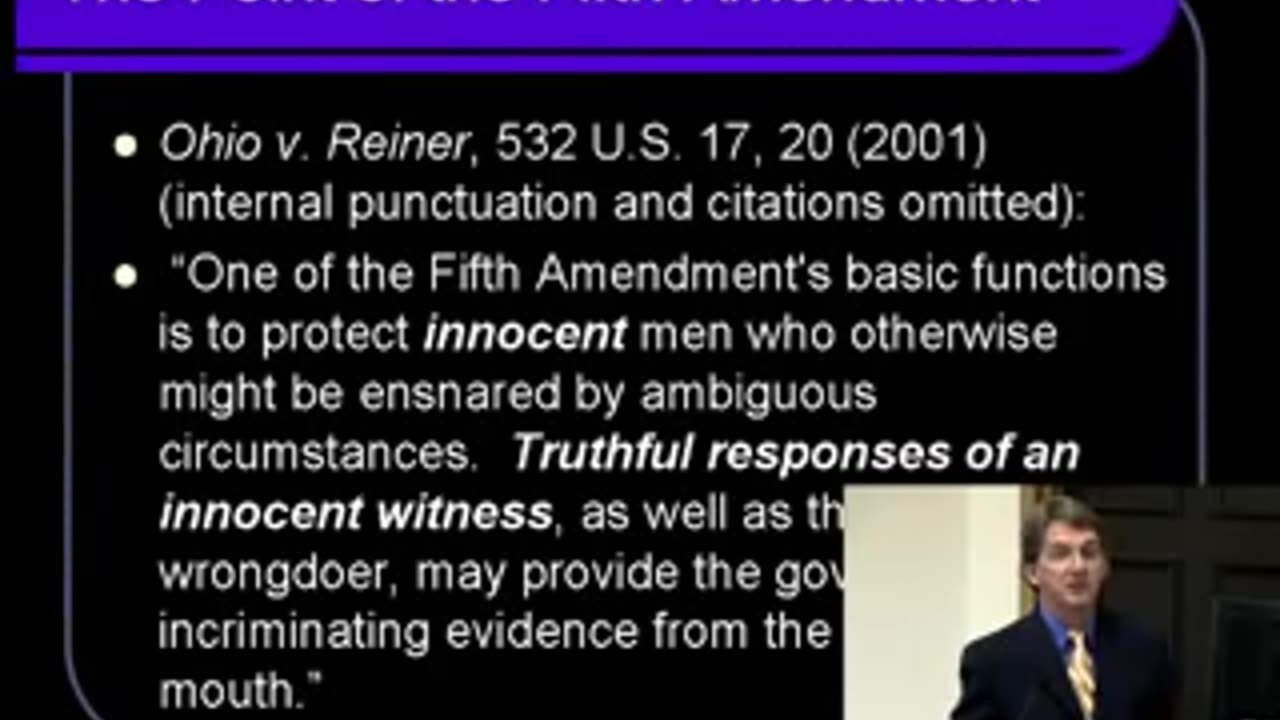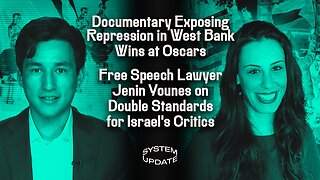Premium Only Content

Your Right to Remain Silent A New Answer to an Old Question - Do Not Talk ? O.K.
Don't Talk to the Police Ever! Fifth Amendment "Right To Remain Silent," When a witness is summoned to testify before a grand jury or at a judicial or legislative proceeding, the lawyer for the witness frequently concludes that it may be in the client's best interest to assert the Fifth Amendment "right to remain silent," at least with respect to certain topics. The lawyer will often give the witness a card to read aloud when asserting that privilege. But precisely what words should the lawyer advise the client to read when invoking the Fifth Amendment privilege?
For more than 100 years, lawyers have shown surprisingly little imagination or ingenuity, advising their clients to state in almost exactly these words: "On the advice of counsel, I respectfully decline to answer on the grounds that it may tend to incriminate me."
This article explains why that unfortunate language is never in the best interests of the witness, and why it naturally tends to sound to most listeners as if the witness is somehow admitting that he cannot tell the truth without confessing that he is guilty of some crime. The article also points out that this archaic invocation is not required by either the language or the theory of the Fifth Amendment, nor by the most recent controlling Supreme Court precedents. The article concludes with a suggestion for an entirely new formulation for invoking the privilege, one which gives greater protection to the rights of the witness and also more faithfully captures what the Supreme Court of the United States has written about the nature of this precious constitutional privilege.
Keywords: Fifth Amendment, self incrimination, right to remain silent
Your Right to Remain Silent A New Answer to an Old Question - Do Not Talk ? O.K. Don't Talk to the Police Ever! Fifth Amendment "Right To Remain Silent," When a witness is summoned to testify before a grand jury or at a judicial or legislative proceeding, the lawyer for the witness frequently concludes that it may be in the client's best interest to assert the Fifth Amendment "right to remain silent," at least with respect to certain topics. The lawyer will often give the witness a card to read aloud when asserting that privilege. But precisely what words should the lawyer advise the client to read when invoking the Fifth Amendment privilege?
For more than 100 years, lawyers have shown surprisingly little imagination or ingenuity, advising their clients to state in almost exactly these words: "On the advice of counsel, I respectfully decline to answer on the grounds that it may tend to incriminate me."
This article explains why that unfortunate language is never in the best interests of the witness, and why it naturally tends to sound to most listeners as if the witness is somehow admitting that he cannot tell the truth without confessing that he is guilty of some crime. The article also points out that this archaic invocation is not required by either the language or the theory of the Fifth Amendment, nor by the most recent controlling Supreme Court precedents. The article concludes with a suggestion for an entirely new formulation for invoking the privilege, one which gives greater protection to the rights of the witness and also more faithfully captures what the Supreme Court of the United States has written about the nature of this precious constitutional privilege. Keywords: Fifth Amendment, self-incrimination, right to remain silent. Why You Should NEVER Talk to the Police. Period. “The police are at my door. They want to talk to me. They told me I am not a suspect. I did absolutely nothing wrong. I have nothing to worry about. They can’t arrest me or do any harm to me if I did nothing wrong, right?”
Wrong.
“But I committed no crime. Took nobody’s life. I didn’t even see anything criminal happen. I don’t know anyone who may have been there. I was 173 miles away when it happened. I don’t know any of the facts except from what others told me. I cannot possible be harmed, right?!”
Again, I am sorry to tell you, but you’re wrong.
What people do not realize is what they don’t know actually can hurt them. If you don’t believe me, listen to the words of former United States Supreme Court Justice Robert Jackson, “[A]ny lawyer worth his [or her] salt will tell the [client] in no uncertain terms to make no statement to the police under any circumstances.” Watts v. Indiana, 338 U.S. 49 (1949) (emphasis added).
Let us look at the situation a little more closely.
If the police ever ask you to come in to the station “just to chat” or are stopping by “because they only have a couple questions for you” — that means one of two things:
You are a suspect;
You are a possible suspect.
Does that clear the picture up? I sure hope so.
There is absolutely no reason for the police to want to have any discussion with you unless they know something that you (probably) don’t. May be your name was mentioned during a discussion with another potential suspect, or perhaps someone is trying to frame you, or, worse yet, you look like the person who was present on the scene and an eyewitness made a mistake in identity. This kind of thing happens all the time. And innocent people end up in custody as a result.
There is no reason to talk to the police especially if you’re innocent.
There is no reason to talk to the police; especially if you’re innocent.
Here are the top ten reasons why you should not talk to the police:*
REASON #1: Talking to the police CANNOT and WILL NOT help you.
Talking to the police cannot make any difference. Nobody can “talk their way out of” an arrest. No matter how “savvy” or intelligent you think you might be, you will not convince them that you are innocent. And any ‘good’ statements that may help you that you tell the police cannot be introduced into evidence because of hearsay rules. It’s a lose-lose situation; don’t talk to the police.
REASON #2: Even if you’re guilty, and you want to confess and get it off your chest, you still shouldn’t talk to the police.
There is plenty of time to confess and admit guilt later. Why rush the inevitable? First, hire an attorney. Let them do their work, and may be you will win your case. It is much harder to win when there is a confession. For example, do you know what happens if the cop cannot be located and there is no confession? The case gets dismissed! (It’s not a universal rule, but it’s more common than you might think.) Don’t talk to the police.
REASON #3: Even if you are innocent, it’s easy to tell some little white lie in the course of a statement.
When people assert their innocence, they sometimes exaggerate their statements and tell a little white lie on accident. That same lie could be later used to destroy your credibility at trial. Don’t talk to the police.
REASON #4: Even if you are innocent, and you only tell the truth, and you don’t tell any little white lies, it is possible to give the police some detail of information that can be used to convict you.
If you make any statement — it could later be used against. E.g. “I did not kill the guy. I was not around the area when it happened. I don’t have a gun. I never owned a gun. I never liked the guy, but, hell, who did?” Bingo. We just found your incriminating statement: “I never liked the guy.” Don’t talk to the police.
REASON #5: Even if you were innocent, and you only tell the truth, and you don’t tell any little white lies, and you don’t give the police any information that can be used against you to prove motive or opportunity, you still should not talk to the police because the possibility that the police might not recall your statement with 100% accuracy.
Nobody has a perfect memory. That includes law enforcement. Don’t talk to the police.
REASON #6: Even if you’re innocent, and you only tell the truth, and your entire statement is videotaped so that the police don’t have to rely on their memory, an innocent person can still make some innocent assumption about a fact or state some detail about the case they overheard on the way to the police station, and the police will assume that they only way the suspect could have known that fact or that detail was if he was, in fact, guilty.
If you overhear a fact from someone else and later adopt it as your own, it can be used to crucify you at trial. Don’t talk to the police.
REASON #7: Even if you’re innocent, and you only tell the truth in your statement, and you give the police no information that can be used against you, and the whole statement is videotaped, a suspect’s answers can still be used against him if the police (through no fault of their own) have any evidence that any of the suspect’s statements are false (even if they are really true).
Honest mistakes by witnesses can land you in jail. Why take the risk? Don’t talk to the police.
REASON #8: The police do not have authority to make deals or grant a suspect leniency in exchange for getting as statement.
Law enforcement personnel do not have authority to make deals, grant you immunity, or negotiate plea agreements. The only entity with that authority is the County or Commonwealth Attorney in state court and the U.S. Attorney in federal court. The officers will tell you they do, but they are lying. They have a carte blanche to lie. Don’t talk to the police.
REASON #9: Even if a suspect is guilty, and wants to confess, there may be mitigating factors which justify a lesser charge.
You may be accused of committing one offense when, in fact, you are guilty of a lesser offense. By confessing to the higher offense, you are throwing away bargaining chips. The prosecutor can try the case with your confession to the higher offense. There is no reason to confess. Don’t talk to the police.
REASON #10: Even for a completely honest and innocent person, it is difficult to tell the same story twice in exactly the same way.
If trial is the first time you tell your story, then there is no other statement by you to contradict any of your facts. However, if you have told your story twice, once at trial, and once to the police, you are probably going to mess some facts up. It’s human nature. A good cross examination by a prosecutor will tear you apart. Don’t talk to the police.
*Taken from a video lecture by Professor Dwayne. The video is reproduced in full below. https://rumble.com/v297voe-your-right-to-remain-silent-a-new-answer-to-an-old-question-do-not-talk-o.k.html
Many years ago, in the then-peaceful suburbs of where we lived on Long Island, NY, my across-the-street neighbor, an older woman, came running to our house in a panic, saying that her house had been robbed!
My father — meaning well — impulsively then ran to & and inside her house, to, I guess, see what he could see.
In the meantime, my mother called the local police, who showed up at the neighbor’s house minutes later — and promptly ARRESTED MY FATHER.
We (my mother and the neighbor, and certainly my father) tried to explain to the police that my father was innocent. But it was only HOURS LATER that the police released (and did not charge) my father.
During those few hours — as well as afterward — my mother, my sister, and I and the neighbor, were debating whether we should files charges against the police for a wrongful arrest/detainment of my father — but we ultimately decided against it, and opted for diplomacy — because, as we reasoned, (a) the police may have had what they had thought was a VALID REASON to arrest my father (although they COULD HAVE come over to OUR house to talk to the neighbor — which they did NOT do!), and (b) it would be better to maintain GOOD RELATIONS with the police than have them “hold a grudge” against us.
In hindsight, apparently “(b)” was a good decision.
-
 4:13:23
4:13:23
What If Everything You Were Taught Was A Lie?
19 days agoDeclassified Government Documents "Open Your Eye Before You Die" Reveal America’s Dark Secrets
3.31K -
 2:51:55
2:51:55
TimcastIRL
6 hours agoTrump Just FROZE ALL Ukraine Aid After Zelenskyy SCREWED Negotiations w/Viva Frei | Timcast IRL
180K57 -
 9:54:54
9:54:54
Dr Disrespect
15 hours ago🔴LIVE - DR DISRESPECT - PUBG - 5 CHICKEN DINNERS CHALLENGE!
197K26 -
 1:58:28
1:58:28
Kim Iversen
8 hours agoSHOCKED! BETRAYED! RFK Jr. FLIPS on Measles Vaccine? | NATO Trap: Europe Could Drag The US to WW3
86.6K189 -
 18:37
18:37
Clownfish TV
6 hours agoThe Oscars Just EMBARASSED Disney and Emilia Pérez...
47.9K20 -
 56:28
56:28
Glenn Greenwald
8 hours agoDocumentary Exposing Repression in West Bank Wins at Oscars; Free Speech Lawyer Jenin Younes on Double Standards for Israel's Critics | SYSTEM UPDATE #416
95.7K83 -
 1:03:34
1:03:34
Donald Trump Jr.
10 hours agoZelensky Overplays His Hand, More Trump Wins, Plus Interview with Joe Bastardi | Triggered Ep.221
152K131 -
 1:13:16
1:13:16
We Like Shooting
19 hours ago $4.87 earnedDouble Tap 399 (Gun Podcast)
47.5K2 -
 1:00:20
1:00:20
The Tom Renz Show
1 day agoTrump Schools Zelensky, The Epstein Files FAIL, & What RFK Will Mean for Cancer
47.5K19 -
 42:47
42:47
Kimberly Guilfoyle
12 hours agoThe Trump effect: More Major Investment, Plus America First at Home & Abroad. Live w/Ned Ryun & Brett Tolman | Ep. 201
130K43